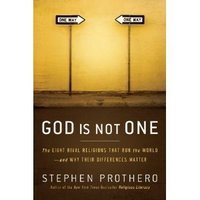I had five roommates my freshman year of college. Three of
them were Jewish. And one was more involved in Jewish student life than the
rest. So one night, I asked her if she’d be interested in a conversation to
compare our religious beliefs. I was cross-legged on the bed. She pulled the
chair out from my desk and turned to face me. “Let’s start with the basics,” I
said. “What do you believe about God?”
“God?” she said, and twirled a strand of hair. “I don’t know
if I believe in God.”
I had no idea what to say, and since I can’t remember what
happened from there, I’m guessing that my attempt at inter-faith dialogue died
on the vine.
It might have helped if I had read Stephen Prothero’s God is Not One: The Eight Rival Religions
that Run the World–and Why Their Differences Matter. Prothero is a
bestselling author and a professor at Boston University, and both his scholarly
credentials and his writing ability shine in this book as he consistently
relates complex ideas in accessible language.
The book explores eight religions (Islam, Christianity,
Confucianism, Hinduism, Buddhism, Yoruba, Judaism, Daoism) through a somewhat
simplistic but nevertheless helpful schema. Prothero attests that all religions
are trying to provide a solution to a problem. He identifies the problem, the
solution, and meanwhile offers historical, political, and doctrinal (where
applicable) context for the religion at hand. Each chapter reads like a long
but engaging lecture. I can imagine him in front of a room full of students,
moving from explanations of Yoruba deities to pop culture references to
politics to the various sects of Islam and back again. And I imagine that those
students are happy to return the following week for yet another set of
provocative questions and useful information… (Click below to keep reading this review)
The entire book is worth reading, but the chapters also stand alone as “cliff notes” to the religion at hand. If you need a quick but scholarly primer in Buddhism, Prothero is your man. With that said, he intends to do more than explain these various religious traditions. He also offers tools for comparative analysis and dialogue. Here, his Introduction becomes essential. Prothero attacks two common problems in comparative religious discourse. In the book’s opening paragraph, he notes the problem with the modern assumption that “all religions are just different paths up the same mountain”:
No one argues that different economic systems or political regimes are one and the same. Capitalism and socialism are so obviously at odds that their differences hardly bear mentioning… Yet scholars continue to claim that religious rivals such as Hinduism and Islam, Judaism and Christianity are, by some miracle of their imagination, essentially the same, and this view resounds in the echo chamber of popular culture…
Some of my favorite conversations about religion come from dialogue with atheists because we are both clear on our points of difference. I know that my atheist friends think I am wrong when I say that Jesus was the Son of God. And they know that I think they are wrong when they say there is no God. It doesn’t mean we don’t respect each other or that we can’t learn from each other. It doesn’t even mean we can’t try to convince each other of what we believe. It just means we understand the terms of our conversation before we begin, and Prothero similarly argues for the merits of admitting irreconcilable differences from the start.
Not only does he knock down the conventional wisdom that all religions are the same, but he also helps us understand the challenges of comparison. We can’t, for instance, compare the Buddhist and Christian concepts of sin, since Buddhists don’t have a concept of sin. In Prothero’s words:
A sports analogy may be in order here. Which of the following–baseball, basketball, tennis, or golf–is best at scoring runs? The answer of course is baseball, because runs is a term foreign to basketball, tennis, and golf alike. Different sports have different goals… If you see sin as the human predicament and salvation as the solution, then it makes sense to come to Christ. But that will not settle as much as you think, because the real question is not which religion is best at carrying us into the end zone of salvation but which of the many religious goals on offer we should be seeking.
As a Christian, I do see the problem with the world as sin, and I would state the “answer” differently than Prothero does in his chapter on Christianity. I would say that participation in the kingdom of God is the answer, but I would add that the only way to participate in that kingdom is through salvation, so my point is a minor one. Prothero provides a fair treatment of the faith I call my own, which helps me assume he does the same with the others in question.
I recommend this book to anyone who wants a basic understanding of the major world religions, and I recommend it as a starting point for conversations about those religions. Perhaps, with it in hand, my roommate and I could have done more than look at each other with puzzled expressions all those years ago.
This review was written for Patheos, a website devoted to religious inquiry. God is Not One is their Book of the Month, and a variety of bloggers were selected to read, review, and submit questions to Dr. Prothero about his book. The questions that I submitted were as follows:
Do you believe that Jews, Christians, and Muslims worship the same God?
Do you believe that it is possible for an individual to be a practitioner of more than one religion? For instance, is it possible to be a Christian Confucian?
To read Stephen Prothero’s answers to my questions, and for more reviews of this book, click here.


